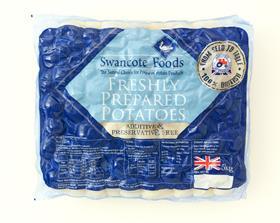
Swancote Foods has relaunched its catering packs of Freshly Prepared Potatoes in a bid to tap into increased demand for pre-prepared potatoes.
According to Swancote, this increased demand has originated due to a raft of new government initiatives - the Universal Infant Free School Meals policy, changes in Food Information Regulations with regard to additives, and a push to encourage British sourcing.
Covered by the Red Tractor scheme, Swancote’s Freshly Prepared Potatoes are 100 per cent British, are grown by a dedicated group of farmers, and prepared and packed via a fully integrated supply chain run by Greenvale, one of the UK’s biggest growers and suppliers of fresh potatoes.
The product is available in 10kg boxes, which contain two 5kg pasteurised heat-sealed bags of part or fully cooked potatoes, are also free of additives and preservatives, and adhere to the updated Food Information Regulations (FIR) which will be enforced from December 2014.
David Farley, business unit director for Swancote Foods, said: “The scope for this product is huge. The versatility makes it ideal for use by any large catering organisation from schools to universities, hospitals to nursing homes. In fact anywhere large numbers of people need to be fed and time is of the essence. We’re very proud of the quality of products and service we supply and as such, when updating the Freshly Prepared Potatoes packaging we have branded it for the first time in 20 years with the Swancote Foods name.”
Swancote was established in 1995, and today operates 24 hours a day, six days a week processing 30,000 tonnes of potatoes a year.
Swancote supplies prepared potatoes including whole, sliced or diced to a broad range of customers for use as ingredients in products such as ready meals, salads, ethnic products, fish cakes, pies, pasties and soups, many produced as private label for the UK’s retailers and for use by caterers.
Over the last 18 months, parent company Greenvale has invested £2 million in the Shropshire potato processing site, updating equipment, including replacing all boiling capacity and cooking equipment, installing new state-of-the-art optical sorters and the imminent introduction of a new multi-vac packaging system on the pasteurisation line.



